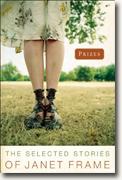Prizes
Janet Frame
book reviews:
· general fiction
· chick lit/romance
· sci-fi/fantasy
· graphic novels
· nonfiction
· audio books
· author interviews
· children's books @
curledupkids.com
· DVD reviews @
curledupdvd.com
newsletter
win books
buy online
links
home
for authors
& publishers
for reviewers

 |
Prizes: The Selected Stories of Janet Frame Janet Frame Counterpoint Hardcover 396 pages December 2009 |
|
If exceptional creative powers and mental instability are sometimes linked, Janet Frame would seem to be a stunning example of a troubling symmetry: giftedness in danger of being sundered by powerful personal turmoil. The New Zealand native (1924-2004) managed to achieve literary acclaim by producing what became award-winning writing all the while coping with heavy personal burdens -- as in labeled a schizophrenic when a young adult and consigned eight years to a mental institution. Discovery of her exceptional literary skills is said to have freed her just in time to avoid a possible lobotomy, and a subsequent psychiatric re-examination reportedly indicated she’d been misdiagnosed originally.
The title story, "Prizes," may be strongly self-revelatory but seems capable of engaging a reader even if it were purely a product of a highly honed imagination: “Prizes. They arrived unexpectedly, or I waited greedily for them at the end of every school year.”Prize-less school-mates are remembered: “Dotty Baker with the greasy hair did not get a prize, Maud Gray, who found it hard to read even simple sentences aloud never got a prize.”In young adulthood, re-visiting her former town, she is jarred by an unexpected encounter: “I saw two beautiful women wheeling prams...Dotty Baker, Maud Gray! As they passed...I could not even assert my superiority...First in geometry, French, English, history...I grudged their proud cloaks as they trooped, clients of love, on their specially reserved side of the world.”Two selections are not only riveting in the story-telling but testimony to the human tendency to hide or outlaw that which is frightening, difficult to face, and/or cannot be explained. In "The Terrible Screaming," people throughout a city are suddenly unnerved to hear screaming from an unknown source. Yet, after the first shock of it, townsfolk dreading the phenomenon itself and of being labeled unbalanced for acknowledging it agree never to admit hearing the continuous chilling wail. “Work and play, love and death continued as usual. Yet the screaming persisted” until a distinguished visitor arrives, reacts to the disturbing din, yet is firmly assured by his greeter, “I hear nothing unusual.” He flees in a highly disturbed state but winds up confined in what is called a rest home. “And outside in the city,” the tale concludes, “the terrible screaming continued its separate existence, unacknowledged.” A like theme of strategic evasion of troublesome truth is seen in "The Mythmaker’s Office," in which a town’s officialdom passes a decree requiring that “All will cooperate in the denial of death.” Newspaper death notices disappear and, if printed, the word "death" becomes (ala certain obscenities now) abbreviated to first and last letters divided by dots or dashes. The fact that people still die spurs a resistance movement and court case: “In the end,” a witness reminded the court, “each one of us is involved in dying, and though we are forbidden by law to acknowledge this, surely it is necessary for us to learn the facts of death and burial?”At the remarkable Janet Frame’s death in 2004 at age 79, it was reported that the newspaper The Australian ran this headline over her obituary: “Nation loses its voice.” The puzzle remains of how much her literary output grew from formidable challenges encountered. The question, however, seems irrelevant considering that terse, respectful journalistic tribute. Originally published on Curled Up With A Good Book at www.curledup.com. © Norma J. Shattuck, 2010 |
| Also by Janet Frame: |
|
|
|
 Click here to learn more about this month's sponsor! |
|
| fiction · sf/f · comic books · nonfiction · audio newsletter · free book contest · buy books online review index · links · · authors & publishers reviewers |
|
| site by ELBO Computing Resources, Inc. | |
 An attribution in
The Literary Encyclopedia to Frame’s “commitment to marginality” seems validated within some pieces in this collection,
yet sheer creativity and mastery of form abound no matter the possible links to her life challenges. Contrasts in subject and tone are common, as in memory-evoked descriptions of children bored and restless at the end of a hot, hot summer of idleness ("The Reservoir") contrasted with a puzzlingly intriguing parable of life and death ("Two Sheep").
An attribution in
The Literary Encyclopedia to Frame’s “commitment to marginality” seems validated within some pieces in this collection,
yet sheer creativity and mastery of form abound no matter the possible links to her life challenges. Contrasts in subject and tone are common, as in memory-evoked descriptions of children bored and restless at the end of a hot, hot summer of idleness ("The Reservoir") contrasted with a puzzlingly intriguing parable of life and death ("Two Sheep").